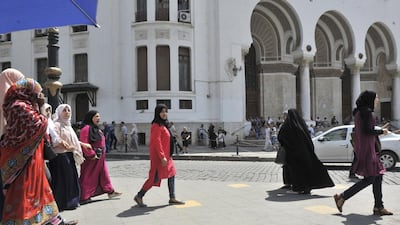ALGIERS // Bars and restaurants that sell alcoholic drinks are being forced out of business and women are changing how they dress in Algeria where, slowly but surely, fundamentalists are gaining ground.
Moderate forces won a civil war against religious extremists who brought the country to its knees in the 1990s. Yet today authorities show little overt concern about the growing grip of Salafis, with their strict brand of Islam.
Algerians who favour the trend see it as a blessing, while critics worry that the rise of Salafism, which interprets the Quran literally, may seep more deeply into society and diminish the chances for a modern Algeria that values freedom of choice.
More than a decade after suppressing an insurgency by extremists, Algerian security forces still combat sporadic incursions. The conflict started in 1991 after the army cancelled elections that an Islamist party was poised to win. The violence left an estimated 200,000 dead and divided society.
But authorities are treading lightly today as “quietist” Salafis who eschew politics make their mark on a country buffeted by high unemployment and a deep-seated lack of confidence in the powers that be.
“Thanks to God, Algerian society is returning to its source of identity,” says Said Bahmed, a philosophy professor at the University of Algiers.
Prof Bahmed, who is close to the moderate party Movement for a Peaceful Society, described the growing number of conservatively dressed women as a “benediction”.
Algeria’s North African neighbours have also been grappling with a new assertiveness from those seeking a greater role for Islam in society and have folded Islamist parties into their power structures.
In Morocco, where a moderate Islamist party runs the government, women increasingly wear veils, especially in working-class neighbourhoods.
The moderate Ennahda party headed Tunisia’s first government after the 2011 revolution and remains strong in parliament, but it rebranded itself this year to separate religion from politics.
Ennahda’s influence did not stop deadly attacks on tourist targets last year, which were claimed by ISIL.
In today’s Algeria, the vestiges of 130 years of French colonial rule are falling away, with ardent help from Salafis. Their influence visibly marks the lively capital of Algiers, where alcoholic drinks were once served on terraces, in bars and at restaurants and women dressed as they liked.
About 100 bars and restaurants around Algiers have been shut down over the past decade, 37 of them in the city centre, according to the chamber of commerce of the wilaya, or region, of Algiers.
Dead leaves are piled up at the locked Claridge bar, a writers’ haunt that folded in May.
Expiring rental contracts and problems linked to an inheritance are among the reasons officially given for closing alcohol-serving establishments. Journalist Mohamed Arezki calls those pretexts that officials use so they will “be in the good graces of Islamists”.
“The message from the authorities is to tell the population that defending the values of Islam is not the monopoly of Islamists,” Arezki says.
“But in this bidding game between the state and Islamists, it is the project of society, of a plural, tolerant Algeria, that is threatened.”
The closure of Mohamed Ait Oussaid’s bar-restaurant in the colonial-style fishing port of La Perouse, on the edge of Algiers, was ordered in 2005. The directive ended a business that had been in his family for three generations.
Mr Ait Oussaid says a former head of the disbanded Islamic Salvation Army campaigned to close his premises for the sake of public order.
“I found myself with three children and their families all out of work,” says Mr Ait Oussaid, condemning “the cowardliness of the state in the face of Islamists”.
Political scientist Mohamed Saidj of the University of Algiers agrees, accusing authorities of “backing down under Islamist pressure”.
“These bars and shops are commercial enterprises that create jobs, pay taxes and are part of a balanced society,” Mr Saidj says.
President Abdelaziz Bouteflika, an infirm 79-year-old in his fourth term, is leaving his mark with the construction of the billion-dollar Grand Mosque of Algiers. With its 267-metre minaret, the mosque is being portrayed as a testament to a tolerant Islam.
When completed next year, the mosque will become the world’s third largest by area, after those in Mecca.
While Chinese workers toil on the Grand Mosque, more modest places of worship have been sprouting across Algeria, some financed by the state, others by private donors.
Rachid Rezouali, a former police chief, said private funders want “to appear like God’s servants in the eyes of the people”. He calls the changing social landscape “a sign that an Algeria of tolerance and modernity is disappearing”.
The US state department’s international religious freedom report for 2015 says volunteer imams at 55 mosques in Algiers were replaced for “spreading Salafism”. But the report also notes a social media campaign ahead of last year’s Ramadan that urged men to avoid retribution by forcing their wives, daughters and sisters to dress according to conservative values.
There have been no reprisals related to dress yet, perhaps because the fashion has already become so prevalent.
For Nacer Djabi, a sociologist, the growing number of women in traditional clothing is a sign that Algeria is reclaiming an identity subverted by a century of French rule. But, he adds: “Most women suffer it because of pressure from society.”
Meziane Ourad, a journalist who fled Algeria after the Armed Islamic Group killed his friend, the celebrated writer Tahar Djaout, in 1993, hardly recognises the homeland he left two decades ago.
“I’ve been back in Algeria more than three months, and I haven’t seen a bare leg,” he says.
* Associated Press

